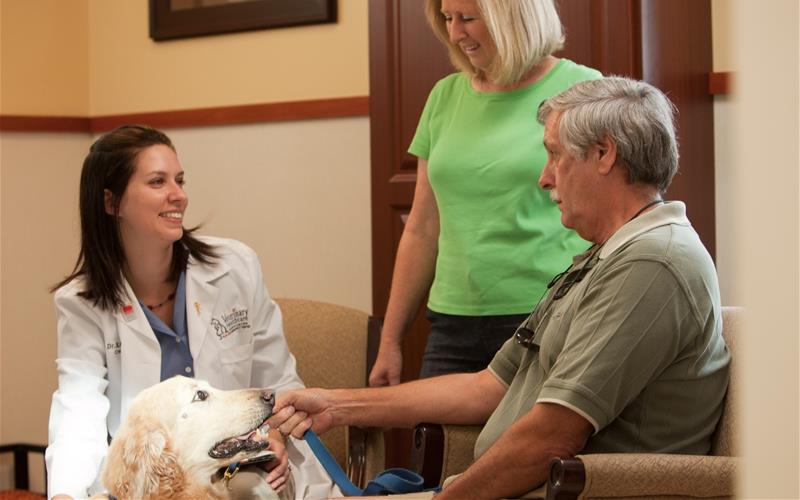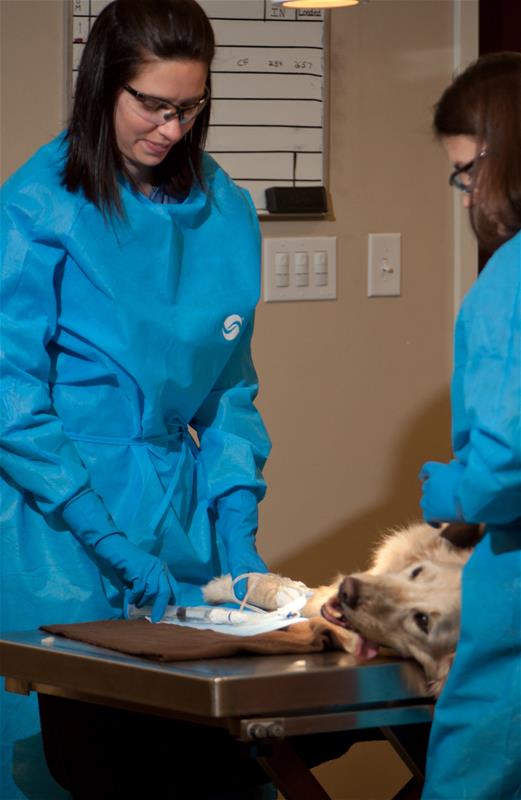Chemotherapy in Pets | Dog and Cat Chemotherapy

What is chemotherapy treatment like in animals?
When a beloved pet is given a diagnosis of cancer, the effect on the animal’s family can be devastating, marked by confusion and sadness. It is important to understand the treatments that are available for cancer in dogs and cats. Chemotherapy may be recommended, either alone or in combination with other treatments, as part of your pet’s cancer management.
Chemotherapy in dogs and cats is different from the human experience since a focus is made to minimize side effects and maintain quality of life.
“While the chemotherapy drugs used for both human and pet cancers are the same, the treatment experience is often drastically different,” explains Kimberly Reeds, DVM, MS, DACVIM (Oncology), of Holland’s Veterinary Referral Hospital in Oklahoma City. “In humans, the goal of cancer treatment is to cure. While many patients experience long survival times, they also experience severe treatment side effects. Unfortunately, cancer is rarely cured in pets,” adds Dr. Reeds, “and the goal of cancer treatment is to provide relief from cancer symptoms, while also providing an acceptable quality of life for as long as possible.”
How is chemotherapy administered in pets?
The chemotherapy drugs used to treat a pet may come in either an injection or pill form. Your veterinarian will review the administration procedures relative to your pet’s protocol and will also inform you if any other procedures such as placement of a vascular access port (VAP) or the use of sedation is required.
Pills may be administered at the veterinary clinic or they may be sent with you to be administered at home. The veterinarian will instruct you how to properly handle and administer these drugs.
Chemotherapy injections will only be administered at the veterinary clinic. Most often, these injections are given as an intravascular (IV) injection but they may also be given under the skin (subcutaneous or SQ), into the tumor, or into a body cavity such as the chest or abdomen.

Photo: Administration of Chemotherapy Dose While the Patient Relaxes
What are the side effects of chemotherapy in pets?
Each chemotherapy drug may have specific side effects, but most chemotherapy medications that are given to pets are well tolerated and some animals experience no side effects at all. Stomach upset and suppressed immune system (low white blood cells) sometimes occur secondary to chemotherapy but can usually be controlled with oral medications. After each treatment, the veterinarian will outline the clinical signs for you to monitor and advise you as to when to seek medical assistance.
Pets, in general, will experience fewer and less severe side effects than humans. This benefit is due to the lower doses and less intense dosing schedules used in pets.
How will the immune system be affected by chemotherapy?
Chemotherapy targets rapidly dividing cells, which can include innocent bystander normal body cells like those in the bone marrow (immune system). As a result, decreases in normal immune system cells is a frequent side effect of chemotherapy, the severity of which depends on the drug administered. Most patients can have a decrease in their normal cells without feeling any different from it. At very low cell levels, the main risk to the patient is the development of a systemic infection (sepsis) or a bleeding problem. The veterinarian will prescribe a specific schedule of blood work (most often a Complete Blood Count or CBC) to be performed to monitor when the cell counts should be at their lowest, so that problems may be addressed if needed. Blood work will also be performed prior to each treatment.
Will my pet have an upset stomach due to chemotherapy?
While undergoing chemotherapy, some pets may exhibit vomiting, diarrhea or a decreased appetite caused by nausea. Most patients will experience these side effects three to five days after chemotherapy has been administered; however, some drugs cause these signs immediately. In the majority of patients, these problems will resolve on their own with no medical intervention. Sometimes, medications are prescribed preventatively in case symptoms occur to address them effectively and quickly.
Veterinary care should be sought for patients that have:
- Severe vomiting
- Diarrhea
- Stopped drinking (to treat any dehydration)
Will my pet lose its fur?
Hair loss (fur loss) is not commonly encountered in pets undergoing chemotherapy since animals do not have the continually growing hair that humans do. Dog breeds that are susceptible to hair loss include, but are not limited to:
- Old English Sheepdog
- Poodles and their mixes (such as Goldendoodles, Labradoodles and others)
- Bichon Frise
- Yorkshire terrier
- Maltese
Many patients may lose whiskers or guard hairs, and shaved hair will return more slowly than normal. Know that these are cosmetic changes and are not harmful to your pet.
Edited by:
Gabrielle Angelo, DVM, DACVIM (Oncology)
April 2020
Articles by Specialty
- Cardiology (18)
- Large Animal Internal Medicine (23)
- Neurology (16)
- Oncology (20)
- Small Animal Internal Medicine (25)
Articles by Animal
- Cats (35)
- Dogs (47)
- Farm Animals (5)
- Horses (12)
